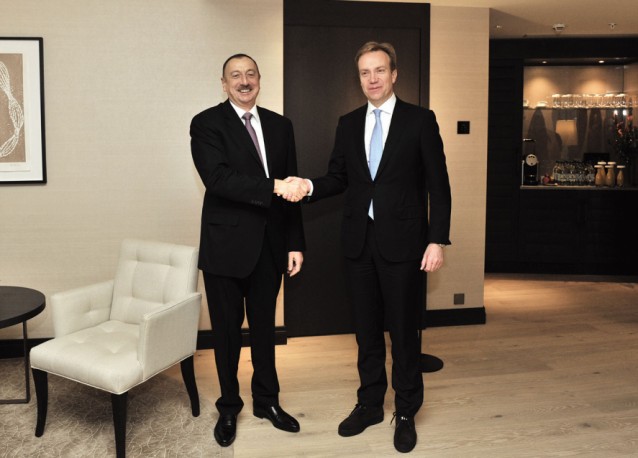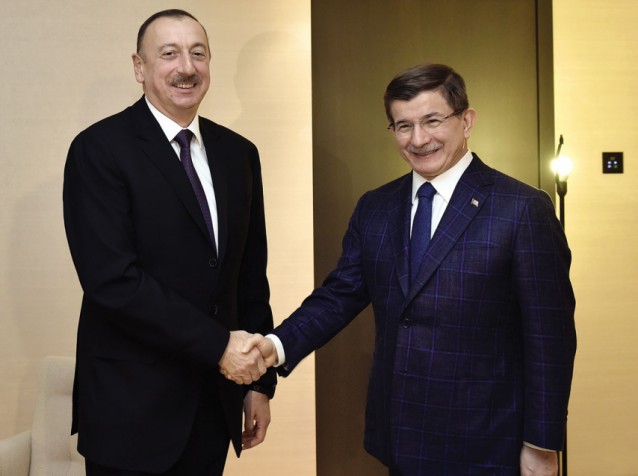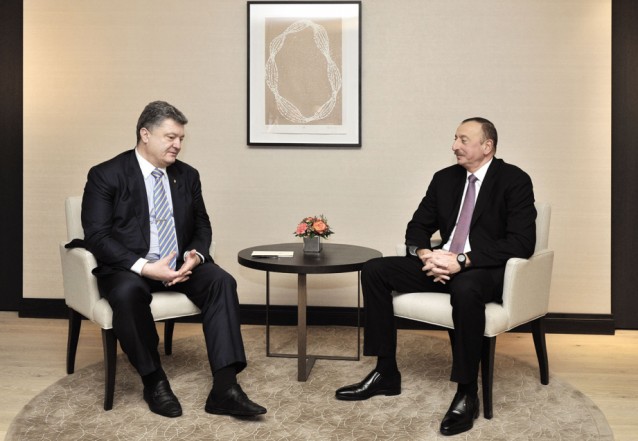The World Economic Forum (WEF) in Davos offers a platform for global political, business and social leaders to discuss the most challenging economic issues facing the world. The 2016 Forum took place from 20-23 January with the theme of The Fourth Industrial Revolution. Azerbaijan participated at the Forum for the 10th time, as political analyst Ilgar Velizadeh explains…
Azerbaijani president Ilham Aliyev’s visit to the Swiss resort town of Davos from 20-23 January 2016 coincided with two iconic anniversaries: the tenth visit to the World Economic Forum (WEF) by an Azerbaijani leader and the 22nd anniversary of Azerbaijan’s cooperation with this authoritative international economic platform.
Background
It was almost exactly 21 years ago that Heydar Aliyev visited the Swiss Alps to represent Azerbaijan for the first time at the prominent global forum held from 27-31 January 1995. In those early days in Azerbaijan’s independence the country was facing serious challenges and risks not only economically, but in terms of its very statehood. Less than a year had passed since the ceasefire agreement over the Nagorno-Karabakh conflict was signed, preceded by The Contract of the Century, which laid the foundations for a momentous oil strategy at a time when outside influences were meddling in the country’s internal affairs.
It was in this context that Heydar Aliyev made his first and now historic visit to Davos to discuss Azerbaijan’s prospects in the global economy with leading politicians and businessmen, many of whom trusted the experienced, savvy Azerbaijani president and, above all, considered his guarantees sufficient to go ahead with large projects in the Azerbaijani energy sector. And they were not mistaken; within a year Azerbaijan had persuaded them with its commitment to developing the economy.
The president took part in Davos again in late January 2000, at a session on The Prospects for the Caucasus and Central Asia: Silk Way or Great Game. Prior to this, in September 1998, a large international conference on restoring the historical Silk Road had been held in Baku on his initiative and attracting the leaders of nine countries (Azerbaijan, Bulgaria, Georgia, Kyrgyzstan, Moldova, Romania, Turkey, Uzbekistan, Ukraine), 13 international organisations and delegations from 32 countries.
There, Azerbaijan had given strong impetus to TRACECA (Transport Corridor Europe-the Caucasus-Asia), the EU-backed transport corridor from Europe across the Black Sea, the Caucasus and the Caspian to Central Asia, promoted as a revival of the Great Silk Road. It was at the Baku conference that TRACECA’s legal basis was agreed with the signing of the Basic Multilateral Agreement on International Transport for Development of the Europe-the Caucasus-Asia Corridor. Another agreement signed there, The Baku Declaration, defined the scope of the programme.
During these meetings and in characteristic fashion, Heydar Aliyev argued convincingly in favour of developing the Europe-Caucasus-Asia transport route and the benefits of doing so to potential partners. In turn, the chairman and founder of the World Economic Forum, Klaus Schwab, told Aliyev that countries throughout the world were showing a great interest in the Caucasus, both in relation to sub-continental transport projects and in developing new routes to deliver Caspian energy to foreign markets. Klaus Schwab also strongly supported the construction of the Baku-Tbilisi-Ceyhan pipeline to transport oil from the Caspian Sea to the Mediterranean, signed in Istanbul in November 1999, which he considered a leading example of Azerbaijan’s increasing prestige.
Continuing the dialogue
With Ilham Aliyev’s election as president a new stage began for Azerbaijan at the World Economic Forum. Newer goals of diversifying the national economy were added to those established while the oil strategy was in full swing.
For Azerbaijan Davos has always been a very productive platform for discussion: the president meets leading businessmen, company managers and prominent politicians to discuss economic and political cooperation. For real and potential partners of Azerbaijan, Davos is a chance to speak directly with the president about, for example, investment opportunities in the Azerbaijani economy. Through a series of meetings and discussions in an informal setting, countries and businesses are able to better define their current priorities and strategies.
Almost from his first years as president, Ilham Aliyev began cooperating very closely with the organisers of the Davos World Economic Forum, which was highly appreciated by the latter ten years later. During his most recent visit to Davos in January, he was presented with a badge of honorary membership of the Davos Club to mark Azerbaijan’s 10th participation in the Forum.
During this period, Azerbaijan has been represented in Davos at the highest level and also hosted a large regional WEF event, the Strategic Dialogue on the Future of the South Caucasus and Central Asia, in Baku in April 2013. Respected economists, experts and politicians arrived in Baku to discuss the pressing economic issues facing humanity and to launch long-term initiatives to stimulate economic development in the South Caucasus and Central Asia.
The decision to hold the event in Baku was noteworthy. Azerbaijan and in particular its capital had been recognised as a regional political, economic and security hub, occupying a key geostrategic location between Europe and Central Asia. The event itself helped to develop a regional business dialogue and Baku’s role in so doing was recognised in Davos this January by Klaus Schwab, who supported the idea of further such initiatives.
New priorities for Azerbaijan
On the eve of the latest forum in Davos, an article by President Aliyev was published called The Future of the Azerbaijani Economy on the Davos Economic Forum’s official website, outlining the current state and prospects of Azerbaijan’s economic development and noting the important achievements so far, such as the reduction of poverty and unemployment and that: Over the past 10 years, Azerbaijan’s economy has grown by 300%.
The content of the article was surprisingly in tune with the theme of the 2016 Forum - The Fourth Industrial Revolution – in its emphasis on diversifying the economy in trying times. Summarising the current challenges, Ilham Aliyev wrote:Oil prices dropped threefold in 2015. For this reason, our revenues have fallen sharply, including, naturally, budget revenues and budget expenditures. We managed to largely preserve budget expenditures in 2015. Unfortunately, the ongoing challenges in the world don’t give grounds for optimism in 2016.
In response, Azerbaijan will focus on rapidly developing the non-oil sector over the coming years, areas such as transport infrastructure and the high-tech industry. The President emphasised that the government attaches a special significance to applying modern technologies. For example, Azerbaijan joined the global space community by launching the Azerspace-1 and Azersky satellites into orbit and has pioneered the use of electronic services by public authorities through the ASAN Service scheme (see ASAN – Revolutionizing Service, March-April 2014 issue of Visions). ASAN Service is part of a wider strategy to create an “e-government,” applying modern management techniques and increasing transparency.So the current difficulties are actually helping to stimulate other areas of the economy. To do this Azerbaijan is counting on close cooperation with other countries and leading global manufacturers. Global business is also embracing Baku, as testified by the numerous meetings held by the president in Davos, with, for example, Gary Andrew Coombe, President of Procter & Gamble Europe, Susan Houser, Vice President of Microsoft and Suma Chakrabarti, President of the European Bank of Reconstruction and Development, as well as the president of Ukraine, prime ministers of Israel, Turkey and Pakistan, the head of the presidential administration of Iran and the foreign minister of Norway. All of these suggest the continuing interest in developing cooperation across various fields with Azerbaijan.Davos gives Azerbaijan an international platform to articulate its development priorities and better define its place in the global economic and political order. The country’s cooperation with the World Economic Forum in Davos has a long history and it will undoubtedly continue to be fruitful going forward.
About the author: Ilgar Velizadeh is a political analyst and frequent contributor to Azerbaijani media on political and economic issues.





